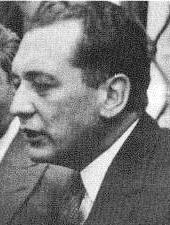Laureano Gomez
Laureano Eleuterio Gómez Castro (born February 20, 1889 in Bogotá ; † July 13, 1965 ibid) was a Colombian politician of the conservative Partido Conservador Colombiano and from 1950 to 1953 President of Colombia .
biography
Laureano Gómez began his political career in 1911 when he was first elected as a member of the House of Representatives ( Cámara de Representantes ), to which he initially belonged until 1918. In 1921 he was re-elected to the House of Representatives and belonged to it until 1923.
In 1924 he was appointed Envoy Plenipotentiary to Argentina and, after his return to Colombia in June 1925, appointed Minister of Public Works to the government of President Pedro Nel Ospina , of which he was until the end of his term in August 1926. After working as an authorized envoy in the German Reich from 1930 to 1931, he was elected senator and in 1932 also chairman of the Partido Conservador. His strong support for Adolf Hitler and Francisco Franco meant that he was soon exposed to hostility in Colombia and had to go into exile several times .
After his return and the end of the Second World War , he was instrumental in the establishment of Mariano Ospina Pérez as a conservative presidential candidate in 1946 . This appointed him in March 1948 as foreign minister in his cabinet. As such, he was also chairman of the 9th International Conference of American States in Bogotá in 1948. This ended, however, due to the beginning of unrest after the murder of the chairman of the liberal Partido Liberal Colombiano , Jorge Eliécer Gaitán . One day after the assassination, Gómez resigned as foreign minister after allegations of involvement in the assassination were made against him.
After spending several months in exile again, he returned after being nominated as a conservative presidential candidate. The 1949 presidential elections were overshadowed by the imposition of martial law and press censorship, as well as the absence of candidates from the Liberal Party.
After his election, he took over the office of President on August 7, 1950 and soon found himself exposed to cross-party hostility from his political opponents. There were several reasons for this, such as the imposed press censorship, the harassment of the courts, the terrorization of Protestants . After increasingly violent nationwide violent rebellions, he handed over the leadership of the presidential affairs to Roberto Urdaneta Arbeláez on November 5, 1951 , but remained nominally President of Colombia until June 13, 1953. After his final removal, he fled again into exile in Spain .
As an opponent of the brutal and incompetent administration of his dictatorial successor Gustavo Rojas Pinilla , he was one of the supporters of the National Front ( Frente Nacional ) in 1957 , from which Alberto Lleras Camargo emerged as president in 1958.
Web links
| predecessor | Office | successor |
|---|---|---|
| Mariano Ospina Pérez |
President of Colombia 1950–1953 |
Gustavo Rojas Pinilla |
| personal data | |
|---|---|
| SURNAME | Gomez, Laureano |
| ALTERNATIVE NAMES | Gómez Castro, Laureano Eleuterio (full name) |
| BRIEF DESCRIPTION | Colombian politician, President of Colombia (1950–1953) |
| DATE OF BIRTH | February 20, 1889 |
| PLACE OF BIRTH | Bogotá |
| DATE OF DEATH | July 13, 1965 |
| Place of death | Bogotá |
